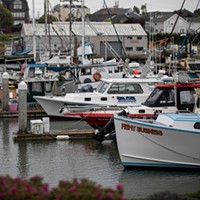[
{
"name": "Top Stories Video Pair",
"insertPoint": "7",
"component": "17087298",
"parentWrapperClass": "fdn-ads-inline-content-block",
"requiredCountToDisplay": "1"
}
]
The California Fish and Game Commission voted unanimously in closed session June 20 to permanently ban former Humboldt Bay Harbor, Conservation and Recreation District Commissioner and current Humboldt County Civil grand juror Aaron Newman from obtaining a recreational hunting or fishing license.
The commission's action is rare. According to California Department of Fish and Wildlife spokesman Clark Blanchard, the commission only approves lifetime bans once or twice a year. Newman's attorney, Paul Brisso, meanwhile, told the Journal he went back through two and a half year's worth of the commission's agendas and couldn't find a single time it had taken a similar action banning someone from recreational hunting and fishing.
"I think it's pretty unfortunate," said Brisso, who serves as the Harbor District's attorney but represented Newman in a private capacity. "I think he has kind of gotten railroaded by the Fish and Game Commission and really the Department of Fish and Wildlife."
But filings in the case show the California Department of Fish and Wildlife, which initiated the action, argued it was a necessary step to protect the state's natural resources from a man with a history of troubling accusations.
The ban stems from a 2014 criminal case in which Newman, a prominent local commercial fisherman, faced allegations that he'd habitually poached abalone and lied to a state agency about it. He ultimately pleaded guilty to three misdemeanor charges, including unlawfully obtaining more than one license in a year, lying to a state agency and failing to properly tag abalone. Two felony perjury charges were dismissed as a part of the plea deal.
Newman was sentenced to three years probation in the case, a period during which he was prohibited from possessing or obtaining a recreational fishing or hunting license by special order of the court. But both Newman's probation and the prohibition have since terminated, which prompted the California Department of Fish and Wildlife to file an accusation with the commission against Newman seeking a lifetime ban. In November, Newman successfully petitioned the court to have his convictions dismissed, essentially expunging them from his record.
Newman, a sitting harbor commissioner at the time, was arrested in June of 2013 after California Fish and Wildlife wardens searched his house and reported finding evidence that he'd poached abalone and a deer as part of what one prosecutor dubbed a "systemic" pattern of behavior stemming back at least a decade.
Abalone fishing is tightly regulated in California and the commission made the unprecedented decision in December to shut down the entire 2018 recreational season amid a rapid decline in the shellfish's numbers due to what scientists are calling a "perfect storm" of ecological conditions. (See "Plight of the Abalone," March 8.)
To legally harvest the mollusks during regular years, one is required to first acquire a permit, known as an abalone report card, which comes with 24 tags. When an abalone is harvested, state law requires that it must be immediately marked with one of the tags, limiting a person to harvesting no more than two dozen of them in a single season.
According to records in Newman's case, he filed a sworn affidavit with Fish and Wildlife back in 2009 claiming he lost his report card after harvesting only three abalone. But when wardens searched his home, they found evidence that he'd harvested 21 before applying for the new replacement card. More troubling, a Fish and Wildlife investigation found Newman filed 11 affidavits with the state between 2003 and 2012 claiming to have lost his abalone report cards during the season, while no one else in the state sought replacement cards more than twice during the same period.
During the search, wardens also reported finding evidence that Newman submitted documents to the state in September of 2012 claiming to have lost his B-Zone deer tag before using it and requesting a replacement, when in fact he'd used the tag on a 4-point buck just eight days earlier.
Newman challenged the Fish and Wildlife accusation seeking to permanently revoke his recreational hunting and fishing privileges and the matter was heard by an administrative law judge, who penned the proposed decision that was ultimately approved by the Fish and Game Commission last week.
In the decision, Judge Ed Washington notes that Newman argued that the deer tag incident was a simple mistake, that he'd lost a X3B zone deer tag and meant to get a replacement but inadvertently received a replacement B-Zone tag instead. When he realized his error, he said he was too embarrassed to return the tag and admit it. When it comes to the abalone, Newman admitted he "was not fully aware" of some tagging requirements and improperly stored some untagged. But he argued that all those lost cards were really lost — left in friends' trucks, washed out to sea or stolen. Additionally, according to the decision, he argued that since he'd already been punished by the criminal court, he shouldn't be punished again by the commission.
Washington and the commission were unmoved.
"[Newman] is a commercial fisherman with approximately 20 years of experience," the decision states. "He has obtained multiple duplicate sport fishing and hunting licenses during that period and should be well aware of the requirements for sport fishing, hunting and replacing lost fishing and hunting licenses and permits. Respondent's explanations for his criminal activities were neither credible nor persuasive when considered with all the evidence presented at hearing. The evidence established that his criminal offenses were committed intentionally, knowingly or recklessly."
Further, the decision states that the goal of the lifetime ban is not to punish Newman but to "protect the public and protect California's at-risk fish and wildlife" and that Newman has demonstrated himself incapable of responsibly exercising the privileges granted by hunting and fishing licenses.
Speaking to the Journal, Brisso said a Department of Fish and Wildlife officer misrepresented Newman's record to the commission, erroneously claiming he had pleaded guilty to giving false information to get duplicate abalone cards. Further, Brisso said, the commission's action is grossly disproportionate to the conduct his client was convicted of, noting that state regulations provide that if violating four hunting or trapping statutes in a five-year period typically results in a three-year ban. Discretionary permanent revocation of licenses only comes into play, Brisso said, when you look at offenses like "using a tracking device for hunting bears to sell body parts" or "knowingly taking a big game animal."
Brisso alleged the Department of Fish and Wildlife was essentially trophy hunting, going after Newman because of his high profile as a former elected official, a representative of various fishing organizations and someone who was actively involved in the state's Marine Life Protection Act agreements.
"I think they're out to generate publicity for themselves, for their enforcement division," he said. "It's something where they know they can generate a lot of publicity in taking an action like this."
Newman was elected to the harbor commission in 2011 and served a four-year term before opting not to seek re-election. A message left on his cell phone seeking comment for this story was not returned by deadline.
Meanwhile, Newman is finishing up his term on the Humboldt County Grand Jury, which included serving on the jail, public works and law and justice committees, according to information provided by the county.
The grand jury is charged with investigating local government agencies and serves as "an ombudsman for citizens of the county" with the authority to explore citizen complaints concerning public officials, according to its website.
Each year, the panel releases a series of reports, which in the past have included investigations into late-night jail releases and the state of the county's Child Welfare System.
To be selected, prospective jurors need to fill out an application (a request for Newman's was denied by the Humboldt County Superior Court, which cited confidentiality), with questions that include: "Are you of average intelligence and of sound judgment and good character?" and "Have you ever been convicted of malfeasance in office or any felony or other high crime?"
The court system is currently looking at whether to perform background checks on candidates.
Applications are reviewed for "statutory disqualifications, qualifications, interest, experience and availability" and those selected to proceed go through a two-step interview process, according to the court's response to a series of questions about the procedure.
Newman and the rest of the panel were then selected in a random drawing by Presiding Judge Joyce Hinrichs. This year, 24 people applied to serve on the 19-member grand jury, which usually also includes five members from the previous year.
While Newman was an elected official at the time of his arrest, his conviction does not meet the definition of "malfeasance in office" because the offenses were not directly tied to his role as a public official, according to David Levine, a professor at University of California Hastings School of Law.
The term "higher crime," Levine says, applies to felonies while Newman pleaded guilty to misdemeanors.
That being said, Levine noted, Newman's appointment to the grand jury may not go against the letter of the law but he says it's a questionable selection given "how close the violation was to his duties in office."
"It's certainly a judgment issue, even if he was eligible," Levine said.
The Fish and Game Commission's action is the last step in a state administrative process, meaning Newman's only recourse would be to seek a writ of mandate from a state judge finding that the commission had abused its discretion in approving the ban. Brisso said Newman is still evaluating his options moving forward.
Editor's note: A prior version of this story was first published online June 20.
Assistant Editor Kimberly Wear contributed to this report.
Thadeus Greenson is the Journal's news editor. Reach him at 442-1400, extension 321, or [email protected]. Follow him on Twitter @thadeusgreenson.t
Speaking of...
more from the author
-
Failed Leadership
- May 2, 2024
-
'On Siemens Hall Hill'
How an eight-day occupation at Cal Poly Humboldt divided campus
- May 2, 2024
-
Failed Leadership
- May 1, 2024
- More »
Latest in News
Readers also liked…
-
Through Mark Larson's Lens
A local photographer's favorite images of 2022 in Humboldt
- Jan 5, 2023
-
'To Celebrate Our Sovereignty'
Yurok Tribe to host gathering honoring 'ultimate river warrior' on the anniversary of the U.S. Supreme Court ruling that changed everything
- Jun 8, 2023




































